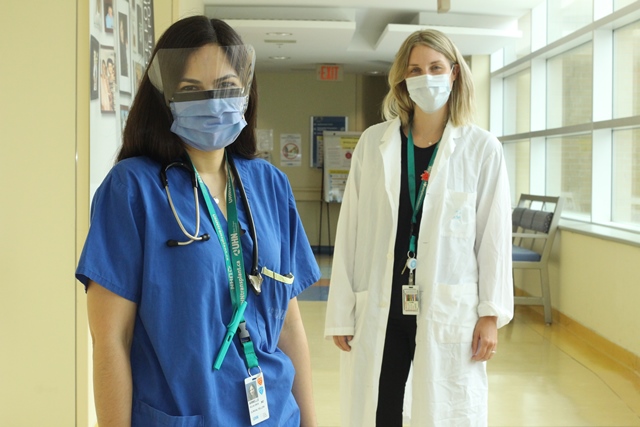
By Ana Fernandes
Is it safe to go back to the office? Should our children get back to the classrooms? Is it safe to spend a weekend at my friend’s cottage? What about public transit? Or a drive-in concert?
For all of us, this reopening stage after the first wave of COVID, is still filled with uncertainty. For an immunosuppressed transplant recipient, the anxiety is tenfold.
“Right now, we see everyone starting to move back to normal, but it is not back to normal for us,” says Joe Zammit, who received a heart transplant at UHN in 2015.
Joe was one of more than 50 heart transplant recipients who participated in a special online event organized by UHN’s Ajmera Transplant Centre staff and by HeartLinks, a patient support group coordinated by volunteers who are also patients at the Peter Munk Cardiac Centre.
Is this safe for a transplant recipient?
One of these volunteers, a heart transplant recipient and also father of two young girls, Eddie Sabat, had himself a lot of concerns about COVID.
“I quickly realized other recipients would be struggling with the same questions,” said Eddie, who then decided to contact fellow volunteer at HeartLinks, Natalie Moubayed, and Heart Transplant Coordinator at the Ajmera Transplant Centre, Kyra Black, to organize an online session.
“This was a wonderful idea and we were happy to help Eddie set this up,” says Kyra. “It turned out to be a very interesting event for me too. I now feel better prepared to answer the COVID questions we receive from patients.”
During the session, Dr. Armelle Perez-Cortez Villalobos, an infectious disease fellow with the Ajmera Transplant Centre, answered questions alongside other staff members.
She explained medicine doesn’t have yet clear answers about COVID and even less so for immunosuppressed populations such as transplant recipients. However, initial data does suggest this group is at a higher risk of complications and death from the disease.
Dr. Perez-Cortez Villalobos highlights however that this doesn’t mean transplant recipients – for heart or any other organ – should lock themselves up or live in fear.
“Having educational sessions like this one is really important, and it can truly save lives.”
Top tips to keep in mind
Dr. Perez-Cortez Villalobos main recommendations were for transplant recipients to follow all public health guidance, with an extra dose of diligence:
- Avoid unnecessary exposures such as dining at a restaurant indoors or being at any poorly ventilated areas;
- Remember to mask and to use appropriate masks, with the right size, fit and with multiple layers of fabric if they are reusable;
- Make sure to physically distance from people who are not part of your social bubble;
- Be very selective with the people who are in your bubble;
- Practicing good hand hygiene and cleaning of surfaces are also important measures to prevent infection;
- If you’re going back to work, consider talking to your boss or colleagues about you being a transplant recipient and therefore at higher risk, so they can be extra cautious about symptom screening;
- If your child is going back to school or daycare, or if your partner or anyone living with you is going back to work, ask them to be extra diligent as well with physical distancing and masking – if possible.
Information is power
Joe Zammit says the session was incredibly useful for him. He says although there is a lot of information online about COVID, there are few trustworthy sources and very little information geared towards transplant recipients.
Particular interesting learning points for him were that gloves aren’t very helpful to prevent COVID infection, receiving guidance on wearing appropriate types of mask, and that when a vaccine comes out it may not be an immediate option for transplant recipients, since studies need to be conducted first in this particular population of patients.
“The event was great! It dispelled myths and also confirmed we should be extra careful,” he says.
“It was also nice to get together with our friends from HeartLinks, even though virtually.”
Joe who is a vice-principal at a high school in Mississauga, Ont., has been working remotely and has self-isolated for over 15 weeks during the initial hit of the pandemic. He still doesn’t have a clear plan for September on going back to work on-site, but says he certainly feels more empowered to make informed decisions and feel less anxious about them.
“Fear is a funny thing for us. As we’ve faced so much already, I think it comes in a different paradigm.
“And at the same time, we’ve gone through our surgeries and treatments not to be locked up, but to be able to live. So hopefully, with the help of our peers and our care teams, we can get out there a bit more while also taking good care of the gift of life we received with our transplants.”
Ana Fernandes is a Senior Public Affairs Advisor at University Health Network.

